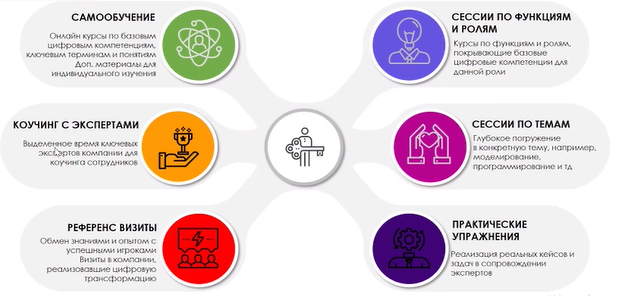
It's no secret that we live in an era when knowledge becomes obsolete every minute. The time has come for permanent self-education. There are several reasons: an increase in life expectancy, the speed of emergence of new technologies and an ever-increasing competition with robots.
For career growth, prosperity and stability, each of us today simply needs to constantly improve our professionalism.
In the past, a person, conventionally, lived one life in one scenario: "one education - one career." The professional grows linearly up the career ladder and retires after 60 years. In the modern world, people often have to change two or three spheres of activity, improve their professional skills, receive additional education, and sometimes, radically change the trajectory of their career.
The very concept of lifelong education appeared in the work of Eduard Lindemann "The Importance of Adult Education", published in the United States in 1926. 100 years later, these ideas are more relevant than ever.
Study, study and study again!
Today M.Video-Eldorado Group is going through digital transformation. Within the company, approaches to business management and interaction with each other are changing.
The product approach has migrated from office flipcharts to real life. The company is implementing the One Retail concept, which blurs the boundaries of online and offline retail for its employees and customers.
The more urgent is the task of shaping the image of the future for team members, endowing them with the necessary knowledge and competencies.
In many respects, thanks to this, the Digital Academy , a corporate educational platform for the development of digital skills and knowledge among employees and external candidates , was opened on the basis of the M.Video-Eldorado Group .

“ Digital Academy ” is a place for realizing the potential of personnel, a core that accumulates and supports all changes in the Group. It is an ideal platform for attracting, developing and self-actualizing talented people, allowing you to acquire or develop the technological skills and competencies necessary to work effectively in today's digital environment.
The perimeter of the Digital Academy includes: digital competencies, digital learning platform, partner ecosystem and content.
It should be said that the idea of training employees within the company is far from new. In "M.Video-Eldorado" successfully exists "EM.Academy".
Another thing is that "EM.Academia" today cannot close all the pressing issues facing business, including those related to digitalization. Therefore, in the future, the "Digital Academy" should incorporate all existing educational projects.
The goals that the "Digital Academy" solves:
- Cultural transformation of the company (changing the mindset of employees);
- Advanced training and retraining of internal managers and specialists (quick transformation in business);
- Adaptation of external digital specialists;
- Study and implementation of modern control systems; business performance and digital skills development.
The transition to a product approach predetermined the change in business processes and the migration of product teams into the business. This inevitably required a change in people's thinking and their cultural transformation.
This process involves the development of a wide range of competencies, much broader than just technical ones, for the whole team, and not just for the "stars". And already today, since product teams are already working within the business.
This is not about abstract theoretical knowledge, but about purely practical things: Python programming, UX design, product management, covering narrow topics.
And who is the teacher?
The entire "Digital Academy" and the schools operating on its basis as educational departments are not only educational centers, but also a center of competence that can prove our technological expertise and potential to the market. It is a powerful complementary tool for branding and better positioning a company in the market.
To solve applied problems, the "Digital Academy" attracts both internal and external teachers. Moreover, the training format itself presupposes a mixed approach, including both reference visits and workshops, with practical training on our own products, and classical lectures.
Approaches to developing digital competencies
The scale of our company's transformation is enormous. It is impossible to achieve the set goals by simple persuasions and slogans. The workload in retail is traditionally high, and the involvement in related, non-core activities is, for obvious reasons, low.
That is why we have formed the basic principles for the development of digital competencies among the company's employees.
Training for everyone. This means that everyone is involved in the learning process today: from CEO to line specialist. Any start on the basis of the "Digital Academy" begins with the CEO and top management and cascades further down.
Self-motivation for development.This block is extremely important and difficult, because, against the background of the general workload and current tasks, it is not a trivial challenge to formulate the need for personnel self-development.
In this regard, we realized that it makes sense to build a track system for the development of team members. This brings a clear picture of the world to the mind of every employee. A person clearly understands what he should become by the end of 2021, in order to meet the needs of the company, while his self-motivation is formed by itself.
The key tool here is the “at the start” assessment at the beginning of the year and the summing up “at the finish line”. This allows you to assess the individual dynamics of changes for each team member.
Today, the set of competencies required by the company has changed so dramatically that people need to constantly study for 12 months in order to meet the current needs of the business. Without desire and motivation, it is extremely difficult to master the required amount of knowledge and achieve a result.
Adaptation to role and function. Training is expected to be tailored to the role and function of the employee. You will only be taught Python programming if you really need it in your work.
Training on the company's case studies. This is a business request. It is imperative to demonstrate the applicability of the proposed set of knowledge. A person immediately understands how they can be used in work.
The learning effect is measurable... We calculate the economic efficiency of certain changes and clearly demonstrate a person's contribution to the business. Based on the results of training, a person can independently calculate his influence.
Digital competency model
The choice of key competencies is one of the most important components of the educational process. The formation of an educational and cultural environment, based on specific corporate competencies, allows you to systematize training, optimize the organizational structure in accordance with current business needs.
It helps identify business sponsors, business customers, and product engineers to meet current challenges and bring the products to market.
Below is a practical example of how you can prepare a Middle product manager from scratch within a company in 5 months (sorry for the low quality of the illustration).

The advantage of internal training is that, being part of the corporate culture, an employee of the company, being inside it, learns from familiar working examples much faster.
For example, by involving in the educational process the director of a store who has his own store of knowledge, we fill his piggy bank with technologies that stimulate career potential. In fact, the company gives a person an incentive for self-development and an additional profession.
As a result, after 5 months, the employee can not only effectively manage the store, but also successfully manage product teams within the business. Moreover, at the middle level.
The process of developing digital competencies is no less interesting. It is an absolutely down-to-earth and measurable process aimed at building digital skills among our team members.
It presupposes a well-built process of mastering practical tools in building digital products, based not only on practices and reference visits, but also on the implementation of the necessary digital solutions in the life of the company.
As a result, we focus on changing the digitalization index of our business. Today it is higher than the industry as a whole, but lower than that of advanced technology companies.

Modules of the "Digital Academy"
We realized that a modular educational system is the most optimal for our needs. Without the availability of basic modules, we are unlikely to be able to solve the problems of transformation of the company.
Today, the following educational modules exist within the Digital Academy:
- Basics of transformation and understanding of business;
- Food school;
- School of Agile Masters;
- School of Data and Analytics;
- School of Programming and Machine Learning.
A number of modules have already been launched ("Fundamentals of Business Transformation and Understanding", "Food School", "School of Agile Masters"). The rest will be launched before the end of spring.
Usually we are looking for recognized experts in the market in our chosen direction, form a partnership and adapt methodological material for our applied tasks.
For example, our "Food School" is developing together with ProductStar. Our colleagues have excellent international experience, which allows us to significantly enrich the expertise of our students with real examples from the business of Amazon and other leading technology companies.
It just so happens that we have practically no one to take the experience of transformation of non-food companies comparable to the M.Video-Eldorado Group in Russia. Therefore, it is interesting for us to study not only Russian, but also Western experience.
Also, for the School of Data and Analytics, we are looking at a number of reputable specialized schools. Our company already has its own Data-office, which has unique competencies for the market, but we perfectly understand the importance of external expertise, including for customer service, HR, retail and others.
Learning formats
The educational toolkit is wide enough. We try to combine different mechanics to achieve our goals.

Based on the results of the training, it is planned to certify students, which is carried out by both internal and external teachers. The certificate is a kind of further ticket to the profession.
For example, yesterday you were a store manager, and after receiving the certificate, you may well apply for higher positions in the company. If you did not work in a company before training, then after successful certification, this is a springboard for entering our business.
An important feature of training at the Digital Academy is the integration into the business rhythm of participants in educational groups. This allows students to adapt the educational process to their own realities, building training in such a way that it does not disrupt the usual rhythm of life and work.
Trackers work with our students, they help to move along the learning track and realize the learning goals of everyone.
Product school
Many experts point out the shortage of product specialists on the market. The demand for people capable of effectively coordinating client requests and technological development of internal IT products within the business is extremely high.
Unfortunately, universities do not train these specialists, at least in the required number. Only today we need about 100 product managers for existing projects. And that figure is growing with the evolution of our microservice architecture.
In this situation, we are forced to raise product specialists within our business. Despite the fact that we also attract external candidates.
It is assumed that we will attract 30-40% of product specialists from outside, and 60-70% will be grown inside the company. This is necessary to maintain a balance between existing experience and external expertise, and not only in the field of retail.
It should be added that for external project participants, an internship is expected on the basis of existing divisions of the company, to apply the acquired skills in practice.
Also, mentors of the school have the opportunity to improve their qualifications and expand their network of business contacts within the framework of ProductCamp, the largest event for product managers in Eastern Europe.
About money and selection
The peculiarity of our educational program is its accessibility. We do not intend to take money for tuition. The candidate is only required to meet a certain set of criteria and have the potential the company needs.
A few words about the selection itself. It is quite transparent and aimed at identifying the competencies and skills that a business needs.
The toolkit is quite versatile: testing, interviewing and solving practical problems. It is important for us to assess a person's motivation, customer focus, communication skills and focus on results. The managerial experience of the candidate can be an additional help.
At the same time, the peculiarity of our Product School is the absence of discrimination by gender, age, geography or previous experience. Given the flexible teaching formats, a person can be trained from any corner of the country.
Today M.Video-Eldorado Group operates in a hybrid model of personnel employment. This assumes a mix of remote and traditional work formats.
Looking beyond the horizon
It is important for us to strengthen existing competencies, preserve the best practices and bring new experience to the life of the company. The M.Video-Eldorado Group has no goal of becoming an IT company. We are retail leaders. It is important for us to bring modern approaches and technologies to the business, which we have been successfully doing for many years.
Considering the special place that M.Video-Eldorado Group occupies in the market, we need to go our own way in terms of implementing the product approach.
The One Retail concept requires from us flexibility, speed of decision-making and expansion of competencies in almost all areas: from technology to management. That is why we strive to take the best, time-tested experience on the market and customize it for ourselves.
At the same time, we are still interested in maintaining market positions and the effectiveness of our business. Practice shows that it is much more profitable to train existing personnel than to constantly search for "stars" in the market. Moreover, it can take much more time and money to find and adapt them than to retrain your employees.
At the same time, we are open to external candidates . The company needs bright and ambitious leaders interested in self-realization and achieving big goals. M.Video-Eldorado Group today is able to provide the necessary space and resources for the implementation of the most ambitious and unique projects.
 Mikhail Karpov, CEO and Co-founder of ProductStar:
Mikhail Karpov, CEO and Co-founder of ProductStar:
« ProductStar — , . «.-» : ProductStar , «.-», , e-Commerce!».